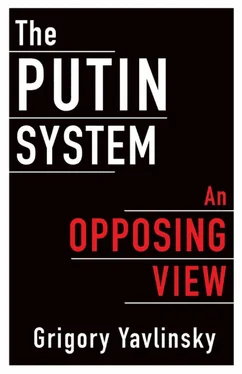In the first decade of the twenty-first century, this issue was resolved in the manner that the ruling circle believed would be the simplest. They suppressed all kinds of dissent and took away opportunities for influencing legislation, ramming through the Duma all the decisions that were made by the actual powers that be ensconced in the Kremlin, without any debate or any compromises. To achieve this, the Kremlin formed a monolithic pro-government majority of legislators, controlled from the outside and based on rigid discipline and the unquestioning execution of the Kremlin’s decisions.
However, such a simple and seemingly efficient solution to the problem of having a parliamentary institution that was superfluous in an autocracy came with a certain price. By effectively stripping the legislature of any real influence in political decision-making, the ruling circle also deprived it of prestige and legitimacy among Russia’s political class and general population. In the short term, this would seem to be convenient for the Kremlin, since it accentuates the absence of alternatives to its rule, which is so important for any authoritarian power. In the long run, however, it makes both the political system and the state itself more vulnerable and fragile. Now every complication and every crisis carries the risk of a potential loss of control over the situation, and this may even be more likely, given the lack of institutions endowed with legitimacy and able to compensate for the breakdown of state governance resulting from erroneous actions or inaction of the authorities. [13] Among the former Soviet countries, there have already been several examples of a situation in which a functioning parliament turned out to be the last resort in preventing the country from slipping into actual chaos and anarchy when it was faced with an acute crisis of governability and the executive hierarchy’s loss of control over the state of affairs.
Such a situation is especially risky for Russia, which has neither a functioning and legitimate representative body nor any alternative supreme authority that could hold power if its current organization breaks down. In addition, it is precisely the inability of Russia’s present-day parliament to exert any real influence that strips it of its legitimacy in the eyes of various societal groups and government agencies. As we know, today’s Russia has neither a hereditary monarch nor a religious body with any real authority sanctified by tradition, nor does the military serve as an autonomous political institution. Thus, there is a high risk of a major breakdown of state governance, with unpredictable consequences for the country.
But the weakness of the Federal Assembly as the representative body is certainly not the only issue. All the other institutions that are essential for a modern state exhibit extreme weakness and an incapacity to perform as they should. This is one of the manifestations of the peripheral character of Russia’s authoritarianism.
The challenges faced by the judiciary during the first decade of the century, for example, were discussed frequently and in much detail by many observers, and there were attempts to reform it, yet none of this has had any significant impact in terms of making the judiciary perform more effectively than before. Perhaps the best evidence of the failure of Russia’s judiciary is that those in control of Russian financial assets, including government assets, continue to incorporate their firms in foreign countries and offshore tax havens, on a mass scale. The owners of these entities justify their actions mainly by citing the “convenience” of the administrative and court procedures involved in managing these assets outside of the purview of Russia’s judiciary (in addition to the implicitly acknowledged political risks of operating in Russia). It is almost universally admitted that Russian courts are very hard to use in defending one’s title to a property.
In today’s Russia, it is just as questionable whether one can count upon the judiciary as an institution to protect individuals against wrongful persecution by law enforcement or other government agencies. At the very least, there has been too much evidence that the judiciary has become infected along with everyone else and that it displays a dismissive attitude toward the law that is typical of peripheral-type authoritarian regimes. In making their decisions, judges are practically able to ignore existing laws and regulations without risking any negative consequences for themselves.
Meanwhile, other significant institutions—those involved in law enforcement as well as those of a purely civilian nature—are relatively weak as well. And the main issue here is not merely the discrepancy between the scope of their mandated functions and the means and resources at these agencies’ disposal, or in their overlapping functions and areas of responsibility, or in the conflicts of interest, all of which are among the traditional challenges facing bureaucracy. There is a problem of a more fundamental nature, as I will discuss.
If we dispense with the facade and the superficial rhetoric, institutions are ultimately the norms and rules that are observed. They rely upon a tradition, or at least upon an acknowledgement of the need for it, and do not get altered on a whim to suit the needs of individual power holders at any particular moment. The distinctive feature of a peripheral authoritarianism is its denial of any steady long-term rules of operation that form the gist and the basis of public institutions in a developed society. Within the framework of such a system, institutions are no more than bureaucratic agencies set up to resolve specific tasks, the parameters of which are defined by the supreme authority. Hence, they play no autonomous role in shaping the direction of the subsequent development of the system.
Likewise, the guiding principles and considerations that these agencies use to accomplish the tasks assigned to them may easily and frequently change, depending on the needs of the moment and even the personal preferences of those who, at any given time, exert the most influence upon the views of the boss at the top of the one-man autocracy. As a result, the rules within the system end up being fluid, unsteady, and incapable of functioning as a glue to hold society together.
Essentially, this is precisely what we observed at the beginning of the twenty-first century in Russia. The hopes that economic stability would bring with it stable norms of everyday life embodied in robust institutions have not materialized. Today, just as at the turn of the century, Russia still has an unstable legal system, a system of law enforcement that acts selectively and is largely not functioning, and a continuously fluctuating set of rules on taxation, on retirement systems, on social, demographic, educational, and migration policies, and the like. This is precisely why the school system, local governments, territorial and cultural communities, political parties, and the entrenched mass media have failed to engage in the task of stabilizing relations in society. (The media must be the subject of a separate discussion, but it is important for our present purposes that their mainstream part has been unable to assume the role of a stabilizing, consolidating institution that would shape the boundaries of public consensus and tame the incursions of the political fringe across these boundaries.)
Finally, it must be noted that this institutional weakness has become a major constraint and a brake upon the development of the sophisticated financial and economic institutions characteristic of developed economies. Thus, over the past decade, the process of forming the institutional infrastructure of modern finance, which started in Russia in the 1990s, has ground to a halt. This is due to the deficiencies of all the institutions mentioned here, first and foremost the judiciary, as well as of the system of government–business relations in the areas of legislation and law enforcement that goes together with the development of finance.
Читать дальше












